It’s hard to believe it, but we’re on to the roaring 2020’s. Games that felt like they released just yesterday, are five or even 10 years old now almost at this point. Trying to sort out the best games of the last ten years and pick a “Game of the Decade” feels like an impossible and thankless task, but we’re going to do it anyway.
It’s so hard because gaming is so subjective, so personal, especially when we’re talking about the best of the best over such a long period of time. Still, an opportunity to look back like this only comes once every ten years so we’re not going to skip out on it.
After some debate, discussion, and lots of vote counting from the Twinfinite staff and contributors, let’s reveal our best games of the past decade.
Best Games of the Decade
15: BioShock Infinite (2010)

Deputy Guides Editor Tom Hopkins: The original BioShock was one of the stars of the previous generation, introducing 2K’s fascinating universe. 2013 was the perfect time for the series to go in a different direction, and Infinite certainly couldn’t be called playing it safe.
Heading into the skies instead of the undersea city of Rapture, Columbia is an incredible setting that comfortably matches the creepy atmosphere of the series’ original setting with a colorful facade that’s hiding a dark and brutal world.
For some, the focus on all-out action bogged down the middle of the game, even though it’s fun throughout, but there’s no denying that BioShock Infinite’s story is one of the best of the decade.
Playing as Booker Dewitt, you gradually learn about Columbia’s secrets as you try to protect Elizabeth from the establishment that kept her captive. The story twists and turns towards the end, but Infinite is also the best example of the importance of an opening.
From the moment you begin in the little rowing boat, to the first time you descend into the beautiful city, and the first time you throw an enemy up in the air, it’s stunning.
It moves at an insane pace, throwing spectacle at you every few minutes until you’re fully invested in the world and the story.
It opts for amazement rather than the original’s slow burn and mystery, but it doesn’t sacrifice the atmosphere and surprise factor that make BioShock special.
Infinite proved that the series can be special without mysterious underwater labyrinths and it’s exciting to see where the recently announced fourth game will go as we enter a new decade.
Best Games of the Decade
14: Persona 5 (2017)

News Editor Giuseppe Nelva: Persona 5 isn’t objectively the best Persona game. While it’s certainly a valid candidate for the title, you’ll hear plenty of different opinions among fans of the series.
Yet, we can certainly say that it’s the game that solidified the popularity of the franchise. Before Persona 5, it certainly had a cult following, but it was still fairly niche. Now it has entered the mainstream, and for better or worse, the name Persona has been recognized all over the world as one of the best among the RPG genre.
Persona 5 combines a great story with likable characters, a fantastic depiction of Tokyo that feels both familiar and slightly alien, deep gameplay, and an absolutely stellar art direction.
We actually had an internal discussion on whether Persona 4 Golden could be considered among this list, but we ended up deciding against it because the original Persona 4 was released in the previous decade. I have a feeling we’ll have the same discussion about Persona 5 Royal, 10 years from now.
Best Games of the Decade
13: Grand Theft Auto V (2013)

Senior Editor Alex Gibson: Grand Theft Auto V is a video gaming behemoth. It’s Rockstar Games’ crowning achievement, universally acclaimed as one of the best open-world games ever made and commercially successful on a level that eclipses almost everything else; it is the best-selling single entertainment product of all time.
Even today, seven years after its launch, GTA V remains every bit as relevant thanks to a current generation remaster and a robust multiplayer offering that is packed full of so much content that it’s practically a sequel at this point.
As a result of this astonishing popularity and its ever-presence on best-selling, most-watched, and all manner of other measures, it’s easy to forget how impressive it is that GTA V’s design was conceived all those years ago.
There are few games even today that match its production value, clever writing, and all-around polish. But back in 2013? It was unprecedented, even if it did feel largely like an expanded version of what had come before in Grand Theft Auto 4.
The decision to split GTA V’s single-player campaign across three wildly different characters was a masterstroke; particularly, for the way Rockstar brilliantly converged them one compelling overarching narrative. Michael De Santa, Trevor Philips, Franklin Clinton are superbly written, which makes their personal struggles so completely relatable even if their criminal pastimes aren’t.
From a gameplay perspective, GTA V still doesn’t feel antiquated at all by modern standards, and back in 2013 it was basically sandbox perfection: mission variety, quests plush with story substance, excellent driving and flying physics, all in what is still a very impressive graphical engine.
On top of all that, its online mode has kept the game relevant and popular long after its single-player campaign has faded into the history books.
Honestly, it’s hard to imagine how Rockstar can improve on the formula going forward, which is likely why they haven’t really bothered and don’t seem in a hurry to do so even with the next-generation fast approaching.
Will there even be a GTA VI? You bet –probably in two or three years’ time, we reckon, which would be an entire decade since its predecessor’s release. Let that sink in.
Best Games of the Decade
12: Life is Strange (2015)

Guides Editor Chris Jecks: Life Is Strange is an odd one. It follows a similar format that was made popular by Telltale’s The Walking Dead but manages to hit a unique nerve that has made it stand out in an increasingly competitive genre.
A narrative-driven experience, Life Is Strange tells the story of Max Caulfield, a girl from sleepy Arcadia Bay that has its own dark secrets. A photography student at the local high school, Max has a keen eye for detail… oh and the ability to rewind time at will. Neat, huh?
It’s this mechanic that becomes the main factor in the decisions you make. Let things play out as nature intended, or use your supernatural powers to steer things in a different direction.
What makes Life Is Strange’s narrative so un-put-downable (yes, I made this Frankenstein word) is the way in which it blends Max’s supernatural talents into this campy, cliche, typically ‘Cali’ high school setting. Nathan Prescott’s the rich-kid jerk. Chloe Price is your badass best friend, and Gabe’s your friend that you kinda like but you don’t know. If it doesn’t sound like your jam from that, I get it. I was doubting it, too.
After the first episode, though, I was hooked, and so was every person I’ve recommended it to ever since.
The characters are believable and likable, the story twists and turns with some truly unexpected moments, and the gameplay is simple and accessible that just about everyone can enjoy the experience. Oh, and the soundtrack is one of the finest of this decade too, with licensed tracks that perfectly encapsulates that moody teen aesthetic.
Life Is Strange is a reminder that games don’t have to be filled with gore and explosions to be immersive and engrossing. It highlights the anxiety-fueled worries of our teenage years and the moments that define us as adults.
Best Games of the Decade
11: Final Fantasy XIV (2010)

News Editor Giuseppe Nelva: Many know Final Fantasy XIV only through its second incarnation, A Realm Reborn, which was released in 2013 and consistently grew to the successful MMORPG it is today.
Yet, the original Final Fantasy XIV was released in 2010, meaning that its story effectively spans the whole decade. While 1.0 wasn’t exactly a great game (to put things kindly), it laid the foundation of the fantastic MMORPG we’re playing now.
Without the harsh lessons learned with 1.0, I don’t believe Square Enix would have released a game as solid as A Realm Reborn, and I doubt the quality of the experience would have ever raised to the high point we recently saw with Shadowbringers.
As a matter of fact, I’m quite positive that Square Enix wouldn’t be the company it is today if Final Fantasy XIV didn’t initially crash and burn the way that it did.
On a more personal level, without the emotional and immersive storyline which led to the fall of Dalamud, the original Warriors of Light would have never become as invested in Eorzea as we are. During the cold winter nights, gather ’round and listen to our stories of the realm that was, and how the flame of failure and defeat forged the glorious realm that is.
Best Games of the Decade
10: Dark Souls (2011)

Reviews Editor Zhiqing Wan: There’s not much else I can say about Dark Souls that hasn’t been said already, except that despite all the memes and silly video game comparisons this series has generated, it’s time to finally acknowledge that From Software’s 2011 action RPG is one of, if not the most influential game of the decade.
At this point, Dark Souls is inescapable. You see shades of it in 2019’s Star Wars Jedi: Fallen Order, Team Ninja is basking in the popularity of Nioh, basically a Sengoku era Souls-like, and Bandai Namco continues to ride on the success of the series with the recently released Code Vein.
Dark Souls redefined the action-RPG genre by introducing interesting elements and decisions players are forced to make every step of the way. There’s a constant push and pull of risk versus reward that’s intrinsically built into the very concept of losing all your experience and currency when you’re killed by an enemy.
The game pushes you further with the tantalizing possibility that you could find a looping shortcut or the next bonfire if you just press on a little bit more, even if you’re out of healing. It sucks you in with fun, telegraphed boss fights that need to be studied. It creates so much intrigue by telling its story through obtuse, cryptic lore descriptions from item pickups.
And guess what? It’s now hip to have recursive level design in your action games, to tell your story through poetically written item descriptions, to have players lose all their experience and money if they die twice in a row without reclaiming their dropped stuff.
Loathe as I am to use the word, the design of Dark Souls is so addictive because it appeals to the part of our brain that relishes in cracking tough challenges and puzzles.
Most modern video games are often preoccupied with holding players’ hands to make sure that you’re comfortable and get to see all the content it has to offer.
Dark Souls doesn’t care about that; you’re either committed to learning its intricacies, or you’re not. The industry is beginning to rediscover the value of creating a game built around that philosophy, and that’s why you can be sure that the Dark Souls memes aren’t going away anytime soon.
Best Games of the Decade
9: NieR: Automata (2017)

Reviews Editor Zhiqing Wan: NieR: Automata is a weird game. You’d expect as much from a director and writer as eccentric as Yoko Taro, who made a name for himself with the Drakengard series and the original NieR. It wasn’t till Automata’s release, however, that he really began to steal the mainstream spotlight. And now, NieR’s everywhere.
Back in 2017, I tried (and failed) to convince my colleagues that NieR: Automata very much deserved to be Twinfinite’s Game of the Year. Sadly, the argument didn’t take, and it ended up being a mere honorable mention on the list, falling below other games like Persona 5 and Super Mario Odyssey.
I’d just like to take this opportunity to point out that the former ended up ranking lower than NieR: Automata on this list of the decade’s greatest and the latter didn’t even make the top 15. So, ha! Take that, fellow co-workers. You’ve finally seen the error of your ways.
Anyway, I argued that NieR: Automata was one of the most self-assured games we’d seen that year, and that statement still holds true. It’s unapologetic, visceral, and once again subverts our expectations of how stories can be told through the video game medium.
Indeed, what makes this game so special and captivating is that it tells a story that can only be told through this interactive medium; it simply wouldn’t work as a book or a movie.
Every little detail of the game, no matter how minute it may seem, serves the story in some way. It could be the way the music cross-fades in when you’re talking to a particular NPC, or even the way you adjust the UI and system settings –everything is done with the game’s story and themes in mind.
The gameplay, the music, the unorthodox structure of the story –it all comes together in a glorious package that ultimately leaves players with the most profound, existential question: what are we living for?
NieR: Automata never quite answers that question itself, but despite the immense pain and suffering it makes it characters (and players) go through, it still sends us off on a somewhat optimistic note that sticks with you long after the credits have rolled.
Best Games of the Decade
8: Journey (2012)
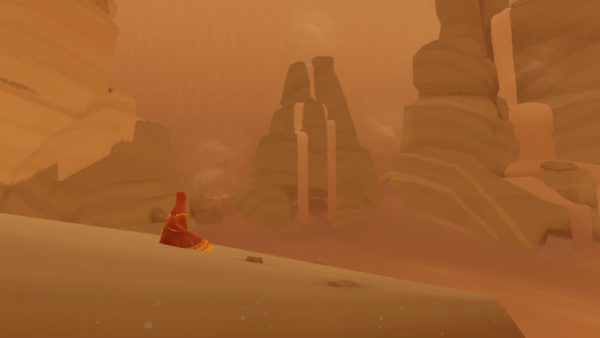
Features Editor Greysun Morales: Back in the early years of the decade when indie games started becoming more mainstream on consoles, the PS3 exclusive at the time, Journey, piqued my interest once I saw just how gorgeous and minimalistic it all was. And once I booted the game up and began to experience the tranquil and spiritual adventure with other players, I was immediately smitten.
Gazing across the vast desert was like nothing else I’ve ever done in a video game and the carefully-crafted areas were simply astounding to look at. You can see the ripples in the sand, the creatures you would run into were amazing to look at, but also were terrifying to encounter, and the swelling of the music at points gave me goosebumps.
I loved experiencing this journey (no pun intended) with a player by my side with only one way to communicate with one another. There was no way to actually speak through a microphone or send messages to each other and you didn’t even know who you were playing with until the game came to an end and I found that extremely fascinating. Using little chirps and tweets to draw another player’s attention was charming and memorable.
Journey is one of those games that I wish I could wipe my memory of and play over and over again. The epic finale of that game is one of those moments that I can truly never ever forget and I just adored how it all played out.
Best Games of the Decade
7: Red Dead Redemption 2 (2018)

Guides Editor Chris Jecks: Red Dead Redemption 2 is one of the biggest technical marvels when it comes to video games of the past decade.
Few open-world games feel quite so complete, so teeming with things to see and do. Fish to catch, animals to hunt, NPCs to talk to, a murder mystery to solve, a man raised by wolves, a mysterious UFO appearance, selling stolen wagons to fences, seeking out the legendary White Arabian horse, hijacking a train or throwing some helpless NPC under one; iconic gunslingers to hunt down, ample bars to pass the time in with a few games of blackjack, dominoes, or Texas hold ‘em. Yeah, there’s a lot in here.
That’s not even touching on the exemplary story that follows the Van der Linde gang during a time when the Wild West as we know it was being clamped down on once and for all. It’s a ferocious battle between bandits and law enforcement, and it harbors some marvelous voice acting performances to deliver truly immersive cutscenes and edge-of-your-seat moments.
The level of presentation throughout its entirety is simply next-level. Playing through the game in 4K on an Xbox One X or PS4 Pro is simply one of the prettiest you can find this generation with excellent character models and stunning performances, to individual hairs on your horse’s mane and NPCs that go about their daily routines as normal.
Arthur Morgan’s story is one of the most memorable I can remember from this decade, and even outside of the 30+ hour story, there’s still so much more to experience. It’s not enough to just read about it or watch a YouTube video of it. You have to be there, guiding your Arthur through these spectacles. Living vicariously through him.
Top it off with Red Dead Online that’s come along leaps and bounds since its initial release largely thanks to its Frontier Pursuits and you’ve got a game that simply keeps on giving. Westworld may not be a reality just yet, but Red Dead Redemption 2’s probably the closest you can get to it right now.
Best Games of the Decade
6: Uncharted 4: A Thief’s End (2016)

Deputy Guides Editor Tom Hopkins: As a series that defined the PS3 generation, creating an ending that stood out on its own and acted as a satisfying conclusion was a difficult task for Naughty Dog. Nathan Drake and co. have come a long way since Drake’s Fortune in 2007, so A Thief’s End had to be more than a simple romp through precious artifact strewn jungles.
With a brother thrown into the mix (played by the excellent Troy Baker), a rocky relationship, and a nagging feeling that his adventuring days are over, Uncharted 4 is a much more emotional game.
The gameplay remained largely the same, seeing Drake leap between precarious rocks and take on dozens of henchmen in ruins, but it was thrilling nonetheless.
Also, some locations were expanded to bring exploration and different paths into the question. It wasn’t about going from point A to point B anymore.
Naughty Dog have created some of the best characters the gaming world has ever seen, so it’s getting the chance to hang out with them one final time that is A Thief’s End’s highlight.
Through the game’s ups and downs, it’s impossible not to care about what happens to the series’ heroes and the ending ties a bow on everything perfectly.
Drake’s ordeal is over but the series is not killed off entirely. Naughty Dog have proven themselves to be the best around when it comes to character development and storytelling and Uncharted 4 is the conclusion that Nathan Drake deserved.
Best Games of the Decade
5: Mass Effect 2 (2010)
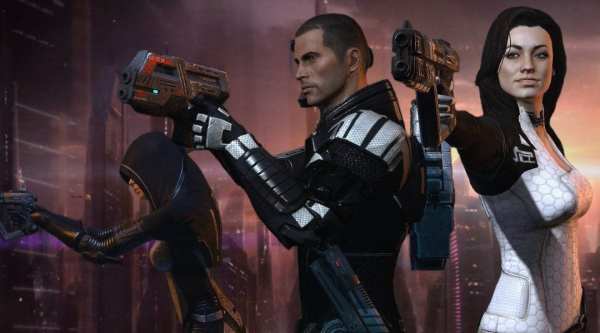
Editor-in-Chief Ed McGlone: Forget this decade, I’ve yet to play a game ever that had as good as a build-up and subsequent payoff than Mass Effect 2 had in its epic story.
Mass Effect 2’s plot, AKA The Dirty Dozen in space, never relents. It starts off rip roaring when a dead Commander Shepard is revived by the villainous Illusive Man and his extremist Cerberus organization and continues to burn brighter as you recruit your elite of group of bad asses.
Along the way you’ll build strong relationships with both major and minor characters, go on loyalty missions that strengthen your understanding of the members of your crew, and you’ll bring those allies with you as you explore the galaxy and unravel the mystery of the collectors.
And once you have made all your choices, and spent tens of hours getting to know your crew, everything you’ve done up to that point will be tested with the game’s final suicide mission.
If you made strong bonds and make wise choices, you’ll be rewarded with a triumphant romp through the center of the galaxy, a trip that Mass Effect 2 sets up as impossible, and bring everyone back in one piece. If you act poorly though, everyone and I mean everyone can perish.
Mass Effect 2 still burns bright as I’ve yet to experience a game that just nails so many different aspects (shooter gameplay, RPG character-building and role-playing, choice-driven narrative, exploration); and for me at least, it’s still the crown jewel of BioWare’s illustrious body of work.
Best Games of the Decade
4: The Elder Scrolls V: Skyrim (2011)
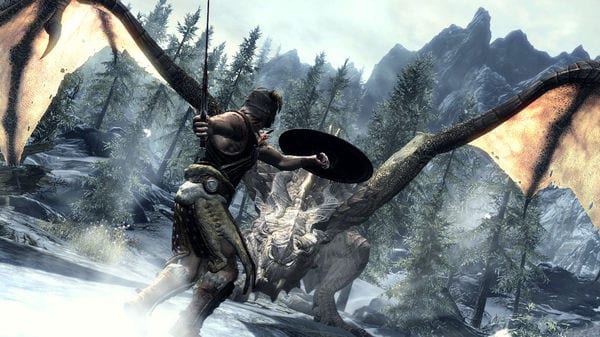
Editor-in-Chief Ed McGlone: Thanks to its ubiquity, the back half of this decade has seen The Elder Scrolls V: Skyrim turn into a meme of sorts. Even Bethesda has gotten in on the joke at this point.
There’s a good reason why Skyrim is literally everywhere and it’s that even over eight years later, there’s still a demand for it to be on every platform imaginable.
It’s among the most accessible, engrossing, beautiful and enjoyable open world games ever created. There’s a nearly never-ending amount of things to do and see in Skyrim, and that list has only grown over the course of the decade as mods and official DLC have expanded the snowy Northern region of Tamriel and neighboring areas.
Every mainline Elder Scrolls game that has released over the last few decades has raised the bar of what open world games are capable of. Skyrim was no different.
Even when The Elder Scrolls VI is established within this new decade, people will still be spending hundreds and hundreds of hours in Skyrim.
Best Games of the Decade
3: The Witcher 3: Wild Hunt (2015)
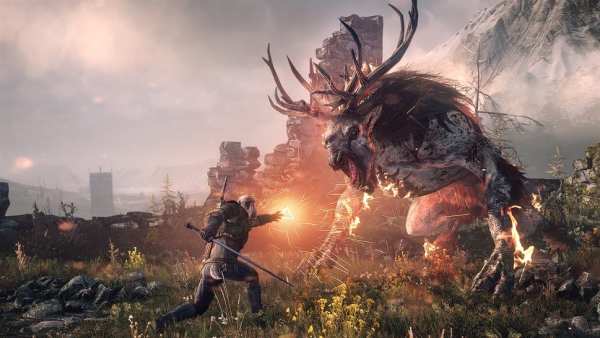
Senior Editor Alex Gibson: At least on paper, when The Witcher 3: Wild Hunt launched in 2015, it didn’t appear to be doing anything extraordinary: the fantasy genre was well-established, and open-world design had been ramping up exponentially for years prior. And yet, in its first attempt, developer CD Projekt totally redefined a genre and became the benchmark for all open-world games going forward.
Never before had we seen a game on The Witcher 3’s scale with such rich storytelling and overall attention to detail. Every quest, side-quest, contract, and treasure hunt was chock full of lore and built with such an obvious passion.
After years of cookie-cutter AAA games built within the same tedious framework, The Witcher 3 felt like a breath of fresh air — finally, a proper video game. It even had an instruction manual, soundtrack, and physical map included in the box, for Pete’s sake!
The Witcher 3’s gameplay, particularly its combat, is often criticized as stiff, and while we do agree it is the game’s weakest attribute, it’s still a cut above genre rivals like Skyrim, and arguably much better than any Assassin’s Creed game up until Origins. Besides, a bunch of new features introduced in the game’s two expansions added a more depth to the role-playing experience and definitely improved combat.
Still, there’s no doubt that The Witcher 3’s best quality is the overall presentation of its environment. No open-world game before or since has matched The Witcher 3 in regards to its depth of world-building.
A combination of what are still top-notch visuals, some of the best music in a video game ever, and brilliant voice acting make locations like Velen, Skellige, and Toussaint feel incredibly authentic. Many contemporary games appear wooden by comparison, despite their best attempt to clone the design ethos championed by CD Projekt Red.
There’s little question that The Witcher 3 has influenced open-world design since its launch, and absolutely no question that its success has propelled CD Projekt Red into the pantheon of the most esteemed developers in the industry. Of course, that makes us extremely excited to see what’s next for both The Witcher franchise and the studio.
Best Games of the Decade
2: The Last of Us (2013)

Reviews Editor Zhiqing Wan: With the Uncharted series, Naughty Dog proved they were more than capable of making good, linear single-player games with characters that were fun to interact with. And with The Last of Us, the developer has proven that they know how to write some damn good stories, too.
The story of The Last of Us isn’t particularly original or groundbreaking, but it’s the characters that make up the experience. The writing is sharp and biting, but subtle, and much of the nuance can be captured in the silence and non-verbal actions in between the action. The characters are complex and emotional, brought to life by phenomenal voice performances and believable, beautiful animations.
Also worth noting is the fact that The Last of Us was released in the 2012-2013 period, when the popularity of ‘dad’ and ‘father figure’ games was at an all-time high, and Naughty Dog’s game somehow still managed to be the most impactful of them all.
Unlike its peers (The Walking Dead, BioShock Infinite), The Last of Us sought to convey much of its story and message through subtlety –whether it’s through Ellie’s slowness to help Joel with the ladder in the game’s final chapter, or Joel’s brief glances at his broken watch whenever Ellie reminded him of his dead daughter.
The Last of Us thrives in silence. This is a game where you can tell what the characters are thinking without needing them to say anything or spell things out for the player.
Despite the predictability of the story (you can only tell so many original stories about zombies and humanity before things get old), Naughty Dog manages to push forward a narrative that’s deeply embedded in every aspect of the game, making it a masterclass in video game storytelling.
Game of the Decade
1: The Legend of Zelda: Breath of the Wild (2017)
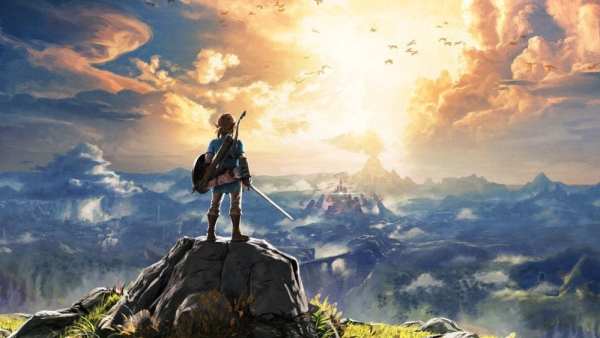
Senior Editor Hayes Madsen: The Legend of Zelda: Breath of the Wild is the kind of revolutionary game that only comes around once in a consoles life cycle, except, this time it launched with the Nintendo Switch. While still retaining the quintessential elements of Zelda, Breath of the Wild manages to redefine a legendary franchise, and drive it in an exciting new direction.
There’s no other open world game out there that gives you the same sense of discovery as Breath of the Wild. The game liberally encourages you to explore, see what’s beyond the next ridge, climb to the top of that mountain.
The world of Hyrule is absolutely littered with puzzle shrines that house rewards, collectible Koroks to find, side quests to undertake, and new locations to discover.
The key here, however, is that nothing feels superfluous, it’s all meaningful in some way. Breath of the Wild reinforces this sense of exploration and freedom with a non-linear story that lets you approach things in any way you see fit.
If you want to go straight to Hyrule Castle and try to beat Ganon without any equipment, you can do that. Or you can uncover the story segment by segment and what really happened, all while preparing yourself for the final fight.
Every single aspect of Breath of the Wild is intelligently designed to tie into that core idea of freedom, from the climbing and stamina to the weapon and equipment systems.
After a generation of open world games with checklists and a million map icons, Breath of the Wild is freeing. Even after so many years Zelda finds a way to redefine itself, and it results in one of the greatest open world experiences ever made.
Congratulations to The Legend of Zelda: Breath of the Wild for being named our Game of the Decade for 2010-2019!
It goes without saying, though, that every game on this list is fantastic and genre defining. Even the next 15 games that would have made this list if we kept going were all GOTY contenders for their respective years as well.
We are blessed to be able to live during a time where we’re seeing such rapid growth and progression in a hobby that we all love. The last ten years have seen video games evolve to a place none of us could have dreamed of when we were younger, and at Twinfinite we’re all looking forward to seeing how the industry grows with another ten years of effort and innovation.

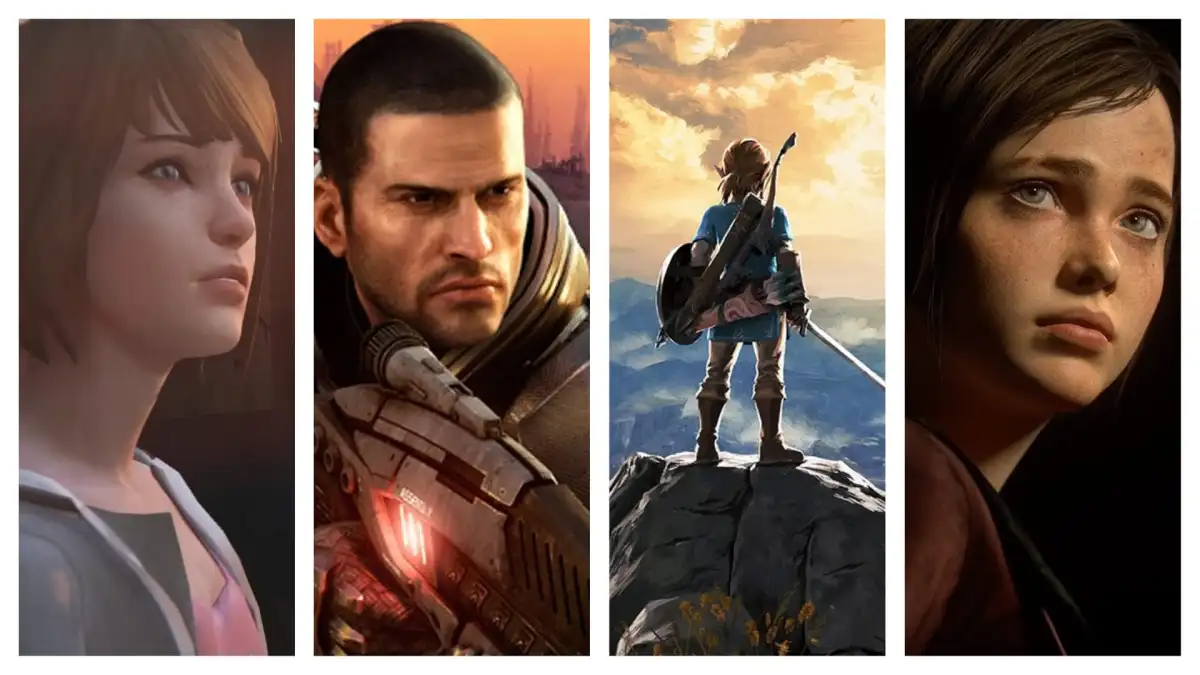



Published: Jan 3, 2020 01:59 pm